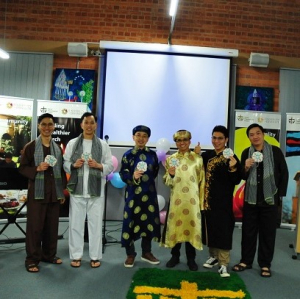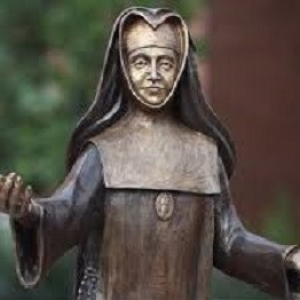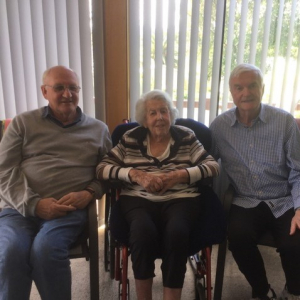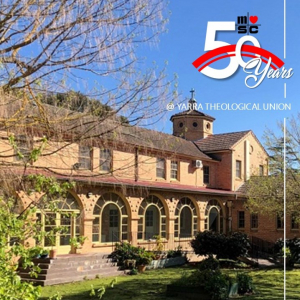Peter MALONE
Both Sides of the Blade/ Fire/ Avec Amour et Archenement
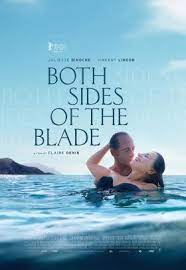
BOTH SIDES OF THE BLADE/FIRE/AVEC AMOUR ET ARCHENEMENT
France, 2022, 116 minutes, Colour.
Juliette Binoche, Vincent Lindon, Gregoire Colin, Bulle Ogier, Issa Perica, Lola Creton, Hind Darwich, Lilian Thuram.
Directed by Claire Denis.
The English title of this personal drama is certainly striking. And, it is the title of the song that is played throughout the end credits. However, there is a more basic English title which is seen on screen, Fire. And the question whether this does justice to the French title which indicates something of love and passion. And, further complication, the title of the original novel, Le Tournant de la Vie, focuses on “Turnings in life”.
This is certainly a film for older audiences. Claire Denis has been directing films for many decades, taking up themes from Africa as well as from Continental Europe and, in her last film, even going into space. And her star, Juliette Binoche, has featured in her recent films. And here she is joined by some of the veterans of French cinema, especially Vincent Lindon, but also Gregoire Colin and Bulle Ogier as Lindon’s mother.
It all opens lyrically, Sara and Jean swimming in the sea, in love, on holidays. It sets a tone, but we remember the title and there will be both sides of a deadly weapon, of a blade.
Juliette Binoche is always an interesting screen presence, here a radio presenter (and Claire Denis using actual guests, Hind Darwich and Lilian Thuram, to discuss identity issues, race issues and culture). And she is living with Jean, and audiences have longer admired Vincent Lindon. Jean has a past, business deals, prison sentence, and is now living with Sara who previously had been in a relationship with François (Gregoire Colin) who had partnered Jean in business.
There is a complication in Jean’s having a son, Marcus, who is cared for by Jean’s mother, 15, mixing badly, difficulties at school…
However, what emerges is a love triangle, Sara encountering François after many years, her previous love for him being kindled, yet her love and constant declarations to Jean and is relying on her love. François is possessive, sometimes callous. Jean is tense, emotionally fragile. And the question is where do audience sympathies lie? Jean goes into partnership with François again, working on a sports stadium, Sara sometimes coming to meetings and socials, encountering François once again.
And the question: who is honest, who is honourable, who is self-centred?
It is important to note the action taking place during the final credits and what our reactions are.
- The variety of titles? The tone? Love, passion, violence? The original title, Le Tournant de la vie, Turnings in Life?
- The Paris settings, apartments, business centres, radio studios? The town of Victory? Homes, streets, football stadiums? The musical score?
- The opening, tranquil, Sarah and Jean, in the sea, love, the holiday? The bond between them? The return home? Settling at home? Jean and his background, phone calls from his mother, his concern about Marcus, Marcus as his son? His partnership with François? Is serving time in jail? The story of his first meeting Sara? Her leaving François for him? His leaving his wife? 10 years passing?
- Sara, her personality, her story, the memories, relationship with François, leaving him, taking up with Jean, his leaving his wife, her concern about his son? Is mother?
- Their ordinary lives, love, absent downs, moods?
- Sara, the radio, the interviews, about issues and women, about white identity, the guests being real life celebrities? Her work with Alice at the studio?
- The re-entry of François? Her seeing him, her murmuring, the memories of the past, her love for him?
- Jean, the discussions with François, the business deal, the sports background, the memories of the past? Jean not telling François about Sara? The development of the deals, meetings, Jean absent, the sports issue, the stadium, Jean and his sports past?
- Jean, driving to his mothers, wanting to see Marcus, Marcus and his problems at school, rebellion? Marcus refusing to see him? Later than meetings, discussions? Some reconciliation?
- Sara, the effect of François, the meetings, the glances, memories of the past? François and his character, the past, with Jean, the 10 years? Staring of passion? The meetings, the sexual encounter and his brutality, her concurring? At the social, his kissing Sara, Jean watching?
- The confrontation between Jean and Sara, about the kiss, the story of withdrawing, the audience having seen the opposite?
- Jean, his rage, outburst against Sara, leaving? Yet his returning, being willing to live with her?
- The two men, expressed love for each, a final decision, in the bath, not calling Jean back?
- The final credits, under them in the shadow, Jean and the sport, and Marcus playing?
Three Thousand Years of Longing
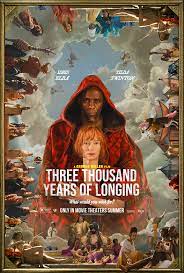
THREE THOUSAND YEARS LONGING
Australia, 2022, 108 minutes, Colour.
Idris Elba, Tilda Swinton.
Directed by George Miller.
What is it like to be a Djinn, trapped in a bottle for 3000 years, yearning to be out, longing for someone to make wishes to release him, some hopes every century or so but then a return to containment?
This is a speculation by British novelist, A.S.Byatt in her short story “The Djinn in the Nightingale’s Eye”. It is also a speculation by George Miller and his daughter, Augusta Gore, imagining a debt for the screen. Miller’s previous film was the much-acclaimed Mad Max: Furious in 2015. He is now involved in a prequel to that film. However, between action films and dramas in the past, Miller has turned to tales and fantasies for family audiences, the Babe films, the Happy Feet films. This time he has a tale and fantasy for an adult audience.
The voice-over narration comes from Alithea, played generally very coolly by Tilda Swinton, even when she encounters the Djinn. She has a very interesting occupation of narratologist, an academic exploring the nature of story and storytelling. As we meet her, she is on a plane on her way to Istanbul for a conference on this subject. During a presentation, she has a premonition, then a vision of a very tall aggressively sinister figure from mythology. Momentarily unpoised, she continues with her presentation, then goes to a market where she is attracted to a vase, warned against it, buys it, takes it a hotel and cleans it.
And, what happens when you rub such a jar in the Orient, a genie appears, the Djinn. And this is Idris Elba, looking a touch of a giant beside the diminutive Tilda Swinton, adapting to be out of his bottle, and adapting to the hotel room, many scenes between them as they converse, dressed in the hotel bathrooms. The Djinn himself explains himself, hopes that Alithea will complete three wishes and he will be liberated. But, because her studies of narration and mythologies have led her to determine that science and scientific explanations of the world and of human nature have taken the place of such stories, she is unwilling to make any wishes.
What follows, is a great deal of conversation, philosophical and mythical reflection between the two, and something of a battle of wits as to whether the Djinn will have his wish or not. But, it is punctuated by some mythical storytelling in four chapters. We are taken back to the world of 1001 Nights, Scheherazade, the Arabian Nights. These are stories of the Djinn, his emergence into a particular world, becoming involved, especially with the central woman in each tale, but stories of ill will, violence, and the genie back in his bottle, so to speak. There is an episode from the time of King Solomon the Queen of Sheba. There is an episode from the Middle Ages, the time of Suliemann the Magnificent, the story of a young concubine in love with the Prince, but vengeful deaths of each of them before the young woman can make her wish for the Djinn and he wanders for years until the third story, again a young concubine, bewildered, fearful and wishing him back in his bottle.
There is a final story from the Ottoman Empire, much more positive, an intelligent young woman interested in learning, advised by the Djinn, but eventually feeling overwhelmed and making the fatal wish that she had never met the Djinn, losing everything she had gained.
The rest of the film is Alithea’s response to these stories, her being moved by the Djinn, wanting what is best for him – and returning to London which he finds very difficult, technology, electricity, static, affecting his mind and feelings, almost killing him. And, Alithea is challenged to make the best wishes for the Djinn himself.
So, with all the visual trappings of old tales, with archetypal stories and characters, this is a contemporary version of mythologies to remind us that science is significant for explanations but can it be a substitute for the wisdom of the long tradition of stories and myths?
- The title? The Djin, the genie in his bottle for 3000 years, yearning to get out?
- Based on the short story by A.S.Byatt?
- The imagination of George Miller, his career, violent myths, tales for families? This and adult myth?
- The comment about never a trilogy, the changes in storytelling, the past and the wealth of myths, Alithea recounting them, the conferences with experts? The theory that with the advances in science, science takes the place of myths for explanations of the world, of humans, behaviour?
- Alithea and her telling the story, the narration, her writing is at the end? Her perspective? Herself, going to Istanbul, the conference, the flight, ordinary, at the airport, met by friends, accommodation? Going to the meeting? The compere and his killing her for her responses? Her seeing the tall genie in the crowd, the reaction, composure, continuing?
- The visit to the bizarre, the souvenir, her liking the particular jar, buying it, taking it to the hotel, rubbing and cleaning at, the appearance of the Djinn? Her being startled, her accepting this? The challenge to her theory of narration, myths and explanations?
- The genie from the bottle, size, appearance, the feeling of freedom, in the hotel, both with their bathrobes, the conversation? Her keeping in control? His explanations? The nature of wishes? The limitations of wishes to be made? Wishes from the heart? Alithea and her reaction to the nature of the wishes? Her not wanting to wish?
- The Djinn, his appearance, years, his personality, manner of speaking? The initial explanations?
- The stories, memories of the Arabian Nights, Thousand and One Nights, Scheherazade? The various periods for the stories? The focus on women, love and infatuation? The Queen of Sheba, Solomon, the presentation of the court, flamboyance and colour, action, violence? The role of the Djinn and his being returned to his bottle? The second story, the slave girl, her infatuation, the Prince, his father, the love, the intervention of the father, violence, the banishing of the Djinn? The third story, the brothers, battles, deaths, the concubine, the gin trying to help her, her fear, wishing him back in the bottle? The fourth story, the Ottoman Empire, a quiet setting, scholarly, and his helping the young woman, studies, opening her horizons, the effect on her? Yet the oppression? Wishing she had never met the Djinn and everything vanishing from her memory?
- The decision to return to England, the flight, Alithea and her flat in London? The Djinn and his adapting to London, the technology, the electricity, its effect on him, the debilitation, sounds and music?
- The ultimate effect on Alithea, writing her story, wishing well for the Djinn, making her wish that the two would be forever together, its effect? His weakening, her wishing that he could recover speech? And her third wish that he be free?
- And, ultimately having to let him go? Her work, the writing, the reflections on experience? In the park, his return, returning every so often, renewing the friendship and love? The future?
Black Beach
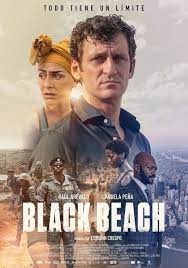
BLACK BEACH
Spain, 2020, 110 minutes, Colour.
Raul Arevalo, Paulina Garcia, Candida Peña, Claude Musungayi, Babou Cham, Lidia Nene, Aida Wellgaye, Jimmy Castro, Fenda Drame.
Directed by Esteban Crespo.
Black Beach is a drama, thriller, for audiences who are interested in international politics, financial intrigues, oil companies, African military dictatorships…
This is a Spanish film with dialogue in Spanish, English, African language. It opens in Brussels with echoes of the United Nations as well as the European Union. It emerges that the central character, Carlos, has spent some time in Africa, those many of the people there, ordinary as well as highly-placed, and has skills as a negotiator. He is employed by members of an international oil company to negotiate in Africa, a fictitious country with filming in Ghana, where an American engineer has been abducted by rebel forces.
On the one hand, Carlos makes the contacts, tries to get government help but is thwarted by the military, finds people that he knew in the past and enlists their help, especially in search of the head of the rebels who was a close friend as was his wife.
There is further intrigue leading to quite some violence, some ruthless military massacres, the confrontation with the rebels and on the spot executions.
Carlos, in danger, is helped by his friends from the past, is able to recover the documents that the engineer had taken with him which could compromise the government and international connections, able to make his escape back to Brussels but concealing the documents, relying on his mother, an official with the United Nations, to collect the documents, make them public and do the right thing.
There is a twist at the end as to what happens with the documents – and a further twist, Carlos using a tape and wires, to get a unaware confession as to what had happened. He preserves his integrity.
- Contemporary drama, United Nations, African countries, dictators and democracy, oil companies, contracts and plans, secrets?
- The initial settings in Brussels, homes, parks and jogging, business meetings? Home life? The transition to Africa, the location photography, the homes of the wealthy, palaces, socials and celebrations, the contrast with poverty, squalor, the wars and the industry, the oil company, the ocean, the water, the exiles? And the military attacks, helicopter fire? The musical score?
- The introduction to Carlos, beginning the day, his love for his wife, pregnant, expecting a daughter? Jogging? The contacts, the oil company, the United Nations, the government, the need for negotiation? His past experience in Africa, his knowledge and contacts? The discussions with Graham? The flight to Africa?
- The fictitious African country, resemblances to actual countries? The government contacts, the president, his brother, wealth, smooth-talking, the general and his presence, the security guards, the officials of the oil company? Carlos and his shrewdness, knowledge, trying to get permissions to travel?
- The official party, the guests, nightclub style, Carlos being supplied with girls, his interrogation of the girl from the past, information?
- Ale, friendship from the past, her relationship with Lucia, meeting Carlos, driving him around, papers and getting into difficult areas? Her continued support? Yet Ale upset with Carlos? Memories of the past, the revelation about Ada, his son, the friendship with Callisto, the photos of the wedding? Carlos and his visit to Madame Claudina? Her information, unwilling to help?
- His visits, the interviews, surveillance by the police? Ale and her help, with Lucia, the boat, their waiting, his not returning, Ale and her anger?
- Finding Callisto, his suspicions, Carlos and talking, the documents, the reality of the abducted engineer, American, his being killed? The compromising nature of the documents, signatures by the President and the Secretary of State, US?
- The attack by the police, shooting Callisto? The helicopter? Taking Carlos?
- Ale, her complaint to Carlos about waiting, the dangers, his going to Madame Claudina’s, the massacre, the dead lying, the contact with Eva, the information about the documents, retrieving them?
- The military attack, Carlos and his being chased throughout the town, the extended chase, the escape with Ale in the car? Unable to get through, captured?
- The phone calls, Carlos and his contact with his mother, the early scene introducing the mother, United Nations work, eager about her granddaughter? Carlos and his phone calls to her, engaging her help with the documents? Graham and his arrival? Carlos and his scheme to get the documents out of the country? Graham getting him out of the country – and his going to the school, seeing the nuns teaching, the information of the boy’s whereabouts, finding him, taking him on the plane?
- Carlos and the return to Brussels, his wife’s shock, then accepting the boy, the scene of him playing in the bath?
- Carlos under surveillance, even while jogging? Talking to his mother, the rendezvous at the airport, her picking up the documents?
- Watching the television, the situation, the president resigning, but the all company going ahead with its plans? Carlos and his dismay?
- The birth of the baby, Carlos taking it to see his mother, named after her? The conversation about the situation, his mother’s justification what she had done, explanation of what she had done? The twist, Carlos being wired, the United Nations getting the confession?
- Carlos returning home, with his wife, daughter, not called after his mother, with the boy, and his integrity?
True Things
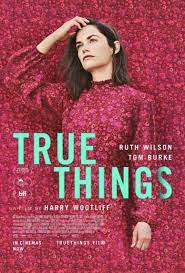
TRUE THINGS
UK, 2021, 102 minutes, Colour.
Ruth Wilson, Tom Burke, Hayley Squires, Elizabeth Rider, Frank McCusker, Ann Firbank.
Directed by Harry Wootliff.
It is not usual to refer to a film, a fiction feature, as a “case-study”. However, it seems helpful to use it here.
As regards the title, there is a glimpse of a text, from a dating agency, during the film which refers to “true things to tell”. And, the novel on which the screenplay is based is actually called “True Things about Me”. So, a film about revelations, and self-revelations.
The me is Kate, mid to late 30s, a complex portrayal of insecurities by Ruth Wilson (whose usual roles are those of strong, even aggressive women). We know little about Kate initially. We see her at work, but soon realise that she is not entirely dependable, is late, act on whims, is threatened by her boss, exasperating her good friend.
Then, suddenly, there is a development. She is very friendly towards a young man, client of the firm, out of prison, a friendly approach. We realise that she is quite susceptible to male charm.
Important for this film as a case study is the visual style of the director and the cinematographer, the use of very frequent close-ups, and extreme close-ups, focusing on Kate, her face, her expressions. And this is reinforced by the style of some of the close-ups, hand-held camera work, leading the audience to a more intimate look at Kate.
The main drama is how she handles this attraction, this relationship with the young man, whom she calls Blond because of his dyed hair (actor Tom Burke, R.B.Galbraith’s Cormorant Strike in the television films of the series). She is comfortable in his presence, despite his sometimes offhand manner, but seemingly genuine protestations of love, even borrowing her car and not returning it for a week, no explanations. He reassures her, and, for a time, she is reassured. However, with a visit to her parents and her outburst against her mother who takes great offence, we realise that Kate is low in self-esteem. And this adds to her insecurities and uncertainties with Blond.
In the language of discernment for making decisions, when she feels desolate, she over indulges superficial cheerfulness, dressing up stylishly and going on a date set up by her friend, drinking, flirting, trying to impose herself on him sexually and his resisting. Her seeming worthlessness is reinforced.
The final act of the film is Blond inviting Kate to a wedding celebration in Spain. She is full of hope. He says the usual things but also acts in his usual casual, offhand way with her. Will she stay? Will she go? How will this all affect her?
This film has no answers. It does suggest some hope. However, we have 90 minutes or so of the close-up portrait of Kate, are invited to speculate about her and her personality, a case-study.
- The title? Others wanting true things about ourselves? The novel title, True Things about Me?
- A British story, universal story? The London settings, offices, homes, restaurants? The exhibition to Spain? The musical score?
- The focus on Kate, the direction and camera style, close-ups, extreme close-ups, hand-held camera focus on Kate, face and expressions? Offering the audience a certain intimacy and knowledge of Kate?
- The film is a case study, portrait of a middle-aged woman, late 30s, the audience not knowing much about her past, encountering her the office, at home, with her parents, friends, the encounter with Blond, the consequences?
- Kate, mid to late 30s, unmarried, living alone, self-image, lacking in self-confidence, lacking in self-awareness? Awkwardness in relationships? The support of her friend at work, wanting to set her up? The callous attitudes, late for work, idling? Reprimands from her boss? The possibility of being fired?
- The visit to her parents, a sympathetic father, her mother urging her on, critical, Kate outburst against her mother? The later visit and trying to help?
- Kate and prospects for life, living alone, relationships? Blond and is coming to the office, cheerful, mentioning his prison background, his hopes, the documents? Pleasant to Kate?
- Blond, his character, the audience really knowing little about him, Kate knowing little about him? His turning up, the outings, his pleasant manner of speaking? The effect on Kate, possibilities for love? Blond affirming her? The outings, the sexual relationship? His mooring her car, keeping it for a week, no information? Her being hurt, reaction, his reassuring her? But his having little regard for her feelings about the car? His continually wanting to make it up to her?
- Kate, her reaction, disconsolate about the relationship with Blond, yet going on the date, the drinking, flirting, covering up her inadequacy, the drive, imposing herself on the date, his refusal, the impact on her self-image, emotions?
- Blond, the invitation to Spain, her hesitation, going, his keeping her waiting at the airport, the accommodation, the party, his being with everyone else, neglecting her?
- Her leaving? The effect of the experience with Blond? Self-awareness, self-image, inadequacies? Or her beginning to make decisions?
Journal for Jordan, A
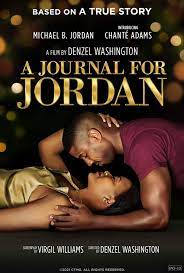
A JOURNAL FOR JORDAN
US, 2021, 131 minutes, Colour.
Michael B.Jordan, Chante Adams, Jalon Christian, Robert Wisdom, Susan Pourfar.
Directed by Denzel Washington.
We realise a Journal for Jordan will have some humanity in its themes when we see that it has been directed by Denzel Washington (one of the four films he has directed). It is based on a true story, the actual journal written by Charles Monroe King for his son, Jordan, and the bestselling memoir by Dana Canedy, King’s partner and the mother of Jordan.
It is very much a piece of Americana. It will appeal to American audiences, especially with its feeling, its sentiment, American wearing of heart on sleeve. Cultures who are more restrained in their expression of feeling may sometimes find it too much. But, it has strong leads with Michael B.Jordan as Charles and Chante Adams as Dana.
This story enables audiences to reflect on American experience in the 1990s to the 2010s. While it opens in 2008, focusing on Dana a top journalist with the New York Times, frustrated by manoeuvres by her bosses, a very determined woman, the screenplay goes back to the 1990s as well as forward as far as far as 2018. Which means audience alert to what period is being dramatised.
Dana, in 1998, already a journalist and successful, has a meal with her parents, her former philandering father now devoutly religious, bonding with her mother and siblings. She is also introduced to Charles King who has served under her father and trained in the military by him. He is in the process of divorce, and has a daughter.
So, on the one hand, this is a story of love and romance, he away on military service, she at work with her writing, much of the drama portrayed by emotional phone calls. The attraction grows greater. As expected, there are ups and downs, he generally very considerate, she sometimes in emotional turmoil. Ultimately, they agree to have a child, but do not marry.
On the other hand, this is a reminder of the politics of the period, the wars in the Middle East at the beginning of the 90s, Charles King and his service, 9/11 and the consequent war on terror, a greater emphasis on the invasion of Iraq where Charles serves (and, later, the young Jordan asking his mother whether the invasion of Iraq was the right thing or not). And there are scenes of active service, ambushes and attacks in Iraq.
As Jordan grows up, he is tormented at school because of his lighter skin colour, continuing elements of racial prejudice, and his longing to know something more about his father. And, finally, his mother gives him the journal to read, Jordan persuading her that they should visit his burial place, and the whole family and dangers journalist friends all coming to the ceremony, Jordan reading from his father’s Journal, each visitor touching the headstone.
(There is an explanation at the end of the film that this sequence is dramatised, highlighting Arlington in the rows and rows, and rows, of headstones, whereas the real Charles King was buried at a cemetery in Ohio.)
- A piece of Americana? From the 90s, wars in the Middle East, 9/11, invasion of Iraq? Race issues? Family issues?
- The title, the screenplay based on Charles Monroe King’s journal for his son? Dana Canedy’s memoir? The bestseller and popular in the US? The focus on the son? The bequest by the father?
- The variety of time settings, the opening in 2008, establishing Dana’s career, persistence, journalist at the New York Times? Time moving back 10 years, the initial encounters with Charles? The passing of the years, 9/11, Iraq, his service, his leave, his death and funeral? And the intersection of the future years, especially 2018, Jordan at 15?
- The emotion of the film? Sentiment? Heart on sleeve? For American sensibilities? For more stiff upper lip, stiff-heart sensitivities? Direction by Denzel Washington?
- The portrait of Dana, harsh upbringing, disappointment with her philandering father, devotion to her mother, her sisters? At home, meals, the father saying grace? The children getting high? Her work as a journalist, living in New York, the New York Times? Pursuing the case, the editor assigning another journalist, the determination?
- The meeting with Charles King, his personality, manner, military training, indebted to Dana’s father? His divorce, love for his daughter, custody issues? With the children, at the barbecue, his respect for her family? His giving her the lift, phone calls? So much of the screenplay using phone calls between them? His painting and sketches? His eventually coming to New York, accommodation, the apartment with Dana, the sites, going to see the impressionist paintings? The growing bond between them? His military life? His proposal on the firing range? Growing happiness? The invasion of Iraq, his being deployed, the scenes in Iraq, the missions, his not being able to come for the birth, coming back and seeing Dana and his son? Her suggestion that he wrote the journal? The final episode, the tanks, the explosions, his being shot, his death?
- Dana, growing love for Charles, but not wanting to follow him around as a military wife, going to Akron and upset at his not phoning, his sense of duty, his apology? The issue of having a child? Her pregnancy? Anxiety, wanting Charles to be at the birth, unable to come, her reliance on her friends from the New York Times, the devotion, at the birth? Mother and child? The scenes with her son, his growing up?
- 2018, Jordan and his age, at school, fights, the issue of his white appearance, the racist taunts? The anti-military taunts? His mother giving him the journal, his reading it, the effect? His wanting to see his father’s grave? The plane trip and the storm, his reading? The family gathering, at the grave, his reading from the journal, everybody touching the headstone? Jordan’s tribute to his mother, his father urging him to love, to choose his family?
- The use of Arlington Cemetery instead of the actual Ohio Cemetery to make the point about the many dead, the visuals of the rows of headstones?
- The film capturing the atmosphere of the period, the changes from the Clinton era, through the Bush era, to the Obama era? And questioning of the validity of the invasion of Iraq?
4.50 from Paddington/ What Mrs McGillicuddy Saw
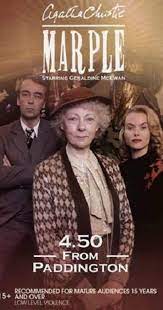
4.50 FROM PADDINGTON/ WHAT MRS McGILLICUDDY SAW
UK, 2004, 94 minutes, Colour.
Geraldine McEwen, John Hanna, Amanda Holden, Griff Rhys Jones, David Warner, Niamh Cusack, Ben Daniels, Charlie Creed-Miles, Ciaran McMenamin, Pam Ferris, Michael Landes, Rob Brydon, Rose Keegan, Pip Torrens, Jenny Agutter.
Directed by Andy Wilson.
This third version of Agatha Christie’s novel, reminding audiences of the popularity of the stories, of Miss Marple. There had been a previous version with Margaret Rutherford in the 1960s, Murder She Said, then the television version with Joan Hickson. This time it is the more affable and insinuating Geraldine McEwan.
This version, as with the Joan Hickson version, keeps fairly close to the original novel. However, the screenwriters in each version have decided to amplify some characters, omit others, downplay others.
While there is an opening sequence during World War II which has its consequences, the action takes place 10 years later, Mrs McGillicuddy, Jane Marple’s friend, witnessing a murder and arousing Miss Marple’s interest, even to getting her friend, Lucy, Amanda Holden, to get a job in the household of the mansion near which the body might have been thrown from the train. Lucy is vivacious, welcomed into the household (and, as with these television films, many vintage actors in supporting roles, David Warner, Ben Daniels, Niamh Cusack) and the family doctor played by Griff Rhys Jones.
The body is found, hard to identify, all the members of the household under suspicion. However, Miss Marple works with the local police chief, played by John Hannah, identifying the body and is a ballet dancer rather than, as suspected, the widow of one of the sons of the family, killed in action during the war.
There is just one more murder – but, Miss Marple working out what happened, setting up the explanation of the crime by assembling all the suspects in a train carriage, pretending to choke on a fish paste sandwich, the doctor helping to free her throat – and Mrs McGillicuddy identifying him as the murderer. The motivation is more noble this time, his love for the daughter of the house rather than his scheme to marry her and get more money. And, the victim was his wife, married in 1939, good Catholic against divorce, an impediment to his marrying the daughter.
An entertaining Miss Marple story.
- The popularity of Agatha Christie novels? Film versions? The portrait of Miss Marple, the three actresses? The different versions of the story?
- The setting, Paddington Station, the parallel trains, Miss Marple’s home, the Rutherford mansion, exteriors, interiors, the mausoleum? The visit to the ballet school? Musical score?
- The situation, Mrs McGillicuddy, nodding off, the guard, seeing the murder, her reaction, the sceptical and cynical police officer? The train search, no body? Her visit to Jane, the situation, Jane and her interest (and reading a Dashiell Hammett novel), getting the timetables, working out the times of the crime, the place, where to get rid of the body?
- The prologue, 1942, Agnes Crackenthorpe dying, her devoted husband, the presence of the doctor, the rest of the family? Memories of the episode? The introduction to Luther, the doctor, the various children?
- 10 years later, the family, Luther crotchety, the memories of Agnes? Emily staying to look after him, the attraction to the doctor, his attention to the family into her? Alfred, business deals, upset with his girlfriend leaving him, drinking, abusive, interactions with the other members, shouting, his death? Harold, his wife, shady behaviour, and the revelation of his attack on Martine? Cedric, the artist, in Spain, style? Brian, the son-in-law, memories of his dead wife, pilot, his son, and his son’s friend, playing at the mansion on holidays? The family gathering to commemorate Agnes? The time of the murder?
- Lucy, singing, Noel Coward playing the piano, the society evening, Miss Marple intruding, Coward’s comment? Lucy and her work for Coward, Jane suggesting the job, the interview, being, accepted by the family, good cooking, at the family table, the boys attracted to her? Her searching for the body, going to the mausoleum, the discovery of the body?
- The mystery of the body, the alleged letters from Martine, Emily not initially revealing them, suspicions that it was Martine? The discovery that she was alive and well? Married, not keeping contact with the family, and her son being the playmate of Brian’s son? Her visit to the family?
- The feet of the body, the suggestion of a dancer, Miss Marple and her enquiries, the visit to the ballet school, the disappearance of the dancer?
- Miss Marple, coming to the town, her long friendship with Tom Campbell, the accommodation, his being in charge of the investigation, the two working together? His interest in Lucy? The visit to the ballet school? The identity of the body? The background of her being the good Catholic?
- The family ill at the meal, Alfred dying? The reactions? The help from the doctor?
- Lucy, Tom Campbell and his attentions, Brian and his attentions?
- The various motives and alibis, Cedric lying about his flight from Spain and his interview for a political job? The doctor indicating Alfred’s behaviour at the pub?
- Miss Marple, phoning Mrs McGillicuddy, her return from Ceylon? The invitation to the theatre, everybody accepting? The device of reconstructing the revelation in the train carriage, the fish paste sandwiches, Miss Marple choking, the doctor helping her, Mrs McGillicuddy seeing him in identifying him?
- The motivation for the murder in the novel, the financial situation, Luther being excluded from his will by his industrial father because of his rebellion, the money to go to the next generation, more money with fewer inheritors? The motive in this film, love for Emily? His marriage to the Catholic ballet dancer, the refusal of divorce, and his option of murder or bigamy? His surrendering quietly? Declaration of love? The effect on Emily?
- Lucy, her choices, not Brian, but Tom Campbell?
To enjoy some cheerful photos. YTU cultural night, MSC student presence.
To enjoy some cheerful photos. YTU cultural night, MSC student presence.

At Blackburn, there are four professed students with Mark Hanns, Trieu, Daniel, Vincent and Hoa. They live at Cuskelly House.

There are two pre-novitiate students studying English as a second language, ling in the presbytery with Alo, Long and Nang.

Khoi lives in Naughton House and has been joined in June by Chung from Vietnam, now able to study at Heart of Life, Siloam program, face to face (when covid allows).

The tradition has been to have a cultural evening but that came to a standstill will lockdown. Now it has been resumed.

The MSC from Vietnam and Blackburn, Khoi and Chung in traditional dress.

Trieu, Secretary of the Students Representative Council, part of the organisation, focus on music.

And a postscript for coming years and formation, a glimpse of Khoi.

And the whole group at the evening.

Some Significant September Days for the Chevalier Family, 2022
Some Significant September Days for the Chevalier Family, 2022
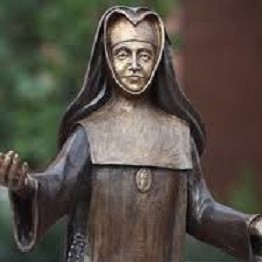
Mother Marie Louise Hartzer appears quite a number of times this month, the death of her husband, memories of her two sons, her meeting with Jules Chevalier, her vows.
1 September, 1897
The erection of the German MSC Province. Blessing of the first MSC house in Hiltrup, Germany.
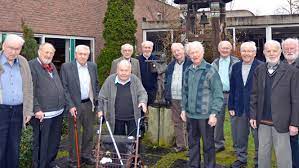
1 September, 1899
First 8 candidates of the MSC Sisters are received as postulants in Hiltrup.
4 September, 1861
Father Maugenest becomes the first MSC to be parish priest of St. Cyr, Issoudun. He remains in this position until 31 December, 1871.
4 September, 1945
The missionaries imprisoned by the Japanese during WWII in Ramale Valley, Papua New Guinea, are set free. The movie, entitled Sisters of War, produced in 2010 by an Australian film company, tells part of this story.
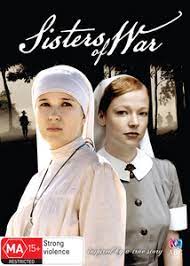
5 September, 1907
This date commemorates the opening of a 'special' MSC General Chapter which revised the Constitutions in the spirit of the "Roman Norms" of 1901. This Chapter occurred only a few weeks before Father Chevalier's death. He could not be present at the Chapter.
6 September, 1962
Father Karel Verwilghen, from the Netherlands, is shot in San José Nueva Ecija, Philippines. He died on 8 September in Quezon City, Philippines.
8 September, 1869
The Archbishop of Bourges, Monsignor de La Tour d'Auvergne blesses Our Lady of the Sacred Heart Chapel in Issoudun and consecrates the altar. The coronation of the statue of Our Lady of the Sacred Heart takes place this day in the name of Pope Pius IX.
8 September, 1876
Father Chevalier meets Marie-Louise Hartzer for the first time!
9 September, 1884
Five Daughters of Our Lady of the Sacred Heart make their first vows. Marie-Louise Hartzer is among them.
12 September, 1855
L'abbé Caillaud, the General Vicar at the time, blesses the humble chapel (barns) in Issoudun and gives to the first two members of the society, Jules Chevalier and Emile Maugenest, the name Missionaries of the Sacred Heart of Jesus. It was on this very day that Jules Chevalier thought, for the first time, of the title "Our Lady of the Sacred Heart".
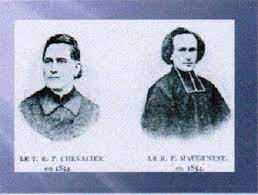
13 September, 1901
Mother Marie-Louise Hartzer makes her application to the French Government for the authorization of the Congregation as exacted by the law of 1 July, 1901. This fact prevents the local authorities at this time during the political-religious unrest from affixing seals to the FDNSC mother house in Issoudun.
13 September, 1912
Father Franciscus Maria Victor Jouët dies in Rome. He is buried in Marseilles in the south of France, in his original diocese. On 2 July, 2003, his remains are interred in the Crypt in the Basilica in Issoudun.
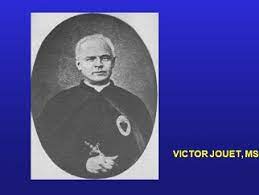
14 September, 1902
Departure of the first seven MSC Sisters from Hiltrup for New Pomerania, New Britain, Papua New Guinea.
19 September, 1869
Victor Hartzer, husband of Marie-Louise Hartzer, dies in Vesoul, France, after being married 11 years. Together they had two sons: Marie Victor Fernand (born 1858) and Marie Léopold (born 1860). Both sons became MSC Priests.
24 September, 1881
The novices of Father Piperon, who arrived in the Netherlands, November 1880, after having been expulsed from France, make their first profession. Among them is Hubert Linckens, who will later become the historical founder of the MSC Sisters.
25 September, 1869
The first MSC General Chapter elects Father Chevalier as First Superior General. Fathers Piperon, Vandel, Bazire and Guyot are elected as his assistants.
26 September, 1889
Marie-Louise Hartzer makes her perpetual vows.
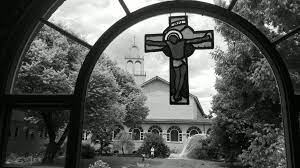
27 September, 1869
Jules Chevalier and his first companions made their perpetual vows at the end of a retreat preached by Father Ramière, SJ.
Vale, Jean Reid, a pioneer of Daramalan College. May she rest in peace.
Vale, Jean Reid, a pioneer of Daramalan College. May she rest in peace.
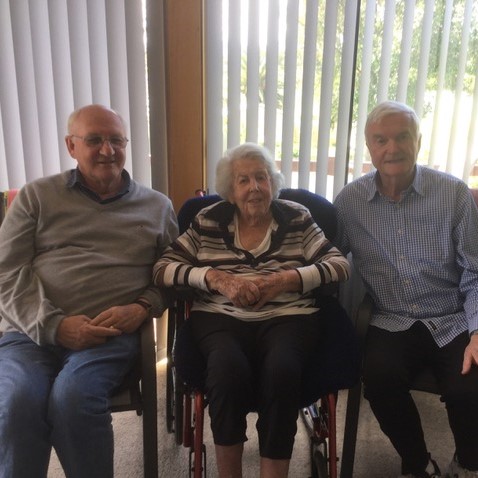
Jean Reid with Barry Smith MSC and Bob Irwin MSC.
In the 20 or so years I’ve been involved with the Daramalan Alumni, I have often had the sad duty to inform you of the passing of one of our members. Today is filled with sorrow as I announce the passing of Mrs Jean Reid, one of the original Daramalan teachers from 1962, who died this evening aged a remarkable 106.
Jean was born in Tenterfield NSW in 1916, later moving to Nowra and Cessnock as her father was a teacher and accepted a variety of appointments over his career.
Jean went on to train at Armidale Teachers College before taking a full-time position at Crown St Boys School in Surrey Hills Sydney.
She went on to marry another school teacher, Jim Reid, before moving to Canberra and initially teaching at Turner Infants School before coming to Daramalan for our opening in February 1962 to teach primary students who were part of the College at the time.
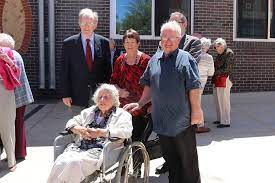
She joined Miss Mary Donnelly (now Mrs Mary Barton) as the only two female teachers amongst 30 odd priests and brothers at the all-boys school as Daramalan was at the time. Unfortunately the religious staff were not used to women, and as an example of the ‘problems’ this posed, both Jean and Mary were asked to have their morning break and lunch in a separate segregated area of the College. Jean recalled that ‘we just picked up our cups and walked across and sat down in the middle’, stating that ‘we’re part of the family’. She credited Fr McMahon, the original Headmaster, with making them welcome and establishing what she later referred to as the ‘MSC family’.
Another issue was that back in the sixties, many of the religious staff were not teacher-trained - although some had academic qualifications – so Jean gladly gave teacher training after school on Tuesdays and Thursdays to untrained staff and brothers from the Residence which was very much appreciated. She was quoted in later years as saying that ‘she pioneered the way for the brothers to become less cleaners and cooks and more educationalists’.
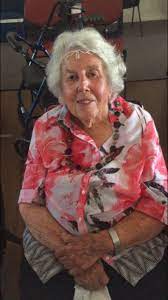
In 2018.
Mrs Reid (as she was always respectfully known) went on to establish the Department of Remedial (later Special) Studies in 1967 which was later to became a model for other schools in supporting students who need additional time and effort with their academic development. The initial class included boys with low IQs, autism, physical disabilities, emotional upsets and irregular attendance with later classes including boys in wheelchairs, boys from homes where little English was spoken and hyperactive boys. Her dedication even extended to ensuring the tuck shop did not supply unsuitable food to ‘her’ boys.
She organised various study tours of Sweden, the UK, and Switzerland to investigate the most recent developments in Special Ed. Along with Br Lysaught, she also managed to fit in time to coach various school Hockey teams.
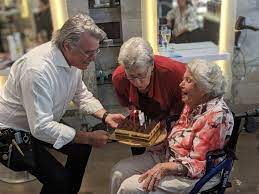
Jean and John had six children but she was still committed to community work including National President of the Catholic Women’s League, member of the committee for World Development and delegate for the World Congress of Catholic Women in Rome.
She retired from Daramalan in 1981 to act as a special education consultant to the MSC colleges around Australia and was awarded the Order of Australia Medal in 1985. The College recognised the impact she had by naming the “Reid Wing” in her honour.
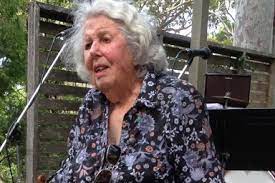
At the time of the bushfires
She eventually retired moving down to Rosedale on the South Coast where she sadly lost her home in the 2019 bushfires. Through the generosity of ex-Daramalan students, we raised over $6,000 to assist her in re-establishing her new life in Moyura and, when presented with the funds said, “My years at Daramalan were amongst the best years of my life, and it meant such a lot to me to be remembered so kindly, and so generously by so many people”.
Jean died peacefully on Thursday 1 September 2022 leaving behind a large and loving family along with dozens of Daramalan boys who would not be where they are today, without the care, patience and attention bestowed on them by Mrs Reid. She will be sadly missed by so many people and in our 60th year, we say ‘goodbye and thank you‘ to a true Daramalan icon.
RIP Mrs Reid.
[Written by Bernard Kane – one of Mrs Reid’s many grateful students]
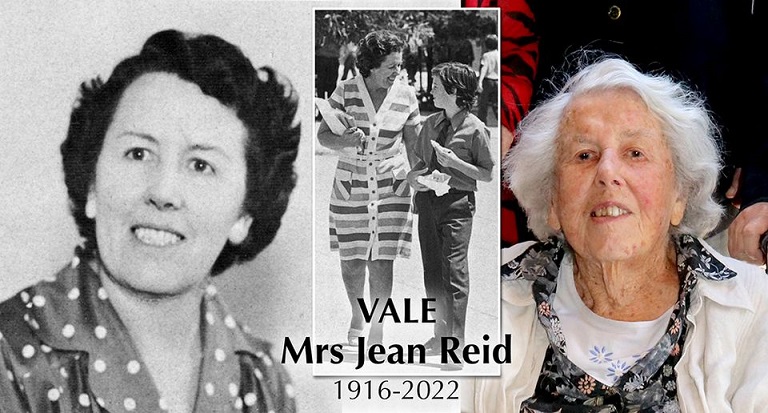
An alert. MSC ebooks on our Website.
An alert. MSC ebooks on our Website.
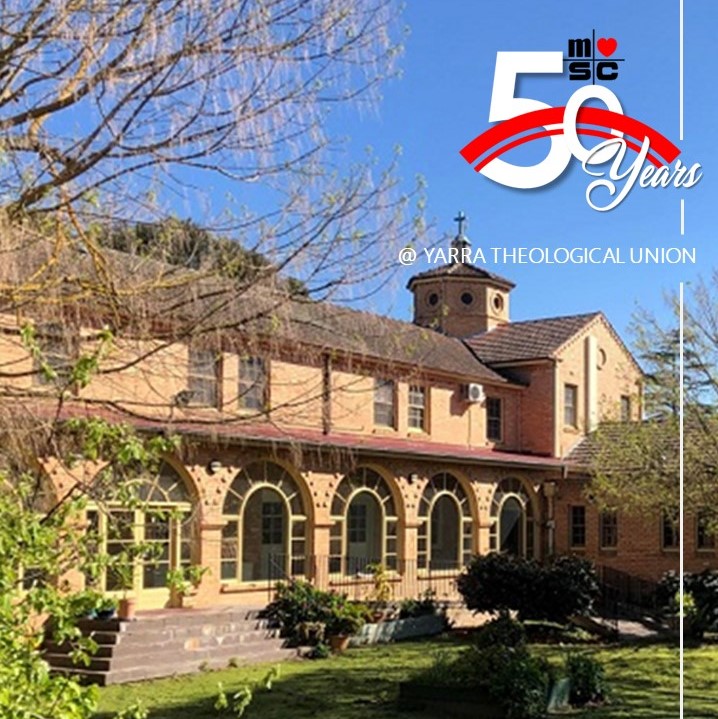
In our online age, fewer books are being published in print, and print runs are smaller. And some books are particularly specialist.
We have a section on our website -check heading Works and Ministries, click and find Publications, click and find MSC books.
When you click the cover photo, the book downloads.
At present you will find the ebook:
MSC Formation and Selection of Candidates, originally prepared at the time of the Royal Commission and brought up-to-date and expanded, a record of our Formation History.
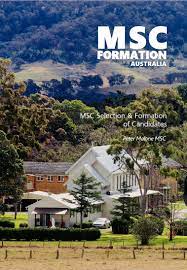
MSC 50 Years at the Yarra Theological Union, memories of MSC staff and students from 1972-2022.
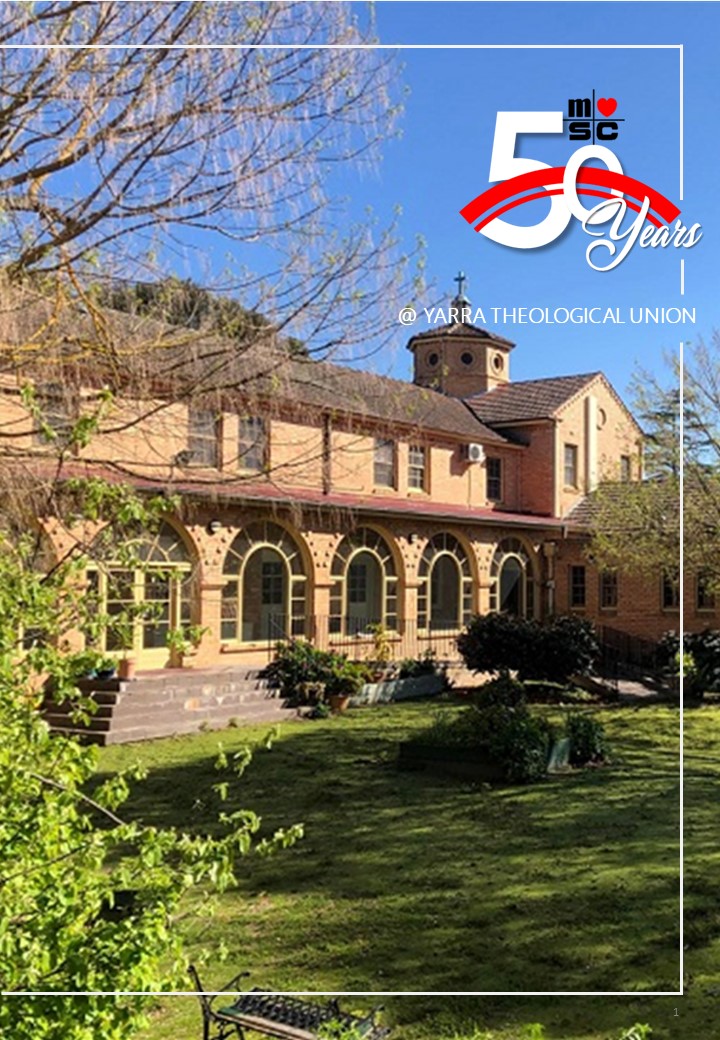
The Bishop with 150 Wives, Bishop F.X. Gsell’s story of the totems, marriage contracts of the Tiwi people.
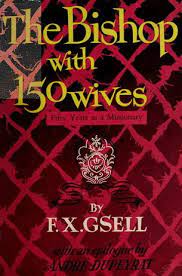
Let people know these books are available online with some clicks to download.
And, we hope, more to come.
